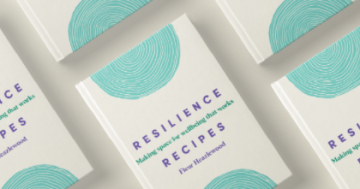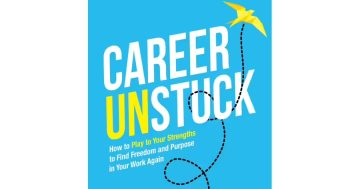Arianna Huffington* says a joyful workplace allows teams and organisations to set ambitious goals and meet them without burning out.
 We have, if we’re lucky, about 30,000 days to play the game of life.
We have, if we’re lucky, about 30,000 days to play the game of life.
So given our fleeting time on earth, how can we bring more joy into our lives?
Joy is one of our most powerful emotions and it’s an effective antidote to burnout.
If a culture of wellbeing is going to be part of our future of work, one of the building blocks has to be joy.
Though we can find joy in solitude, there is also a fundamental social aspect to it.
As Harvard Medical School psychiatrist, George Vaillant put it
“Joy is all about our connection to others.”
Here’s another great thing about joy — it’s contagious.
According to sociologist, Nicholas Christakis
“When you make positive changes in your own life, those effects ripple out from you and you can find yourself surrounded by the very thing you fostered.”
That’s why joy can be so powerful at work, it’s a force multiplier that allows teams and organisations to set ambitious goals and meet them without burning out.
A study by researchers at Warwick University found that joy and happiness made people 12 per cent more productive.
As study author, Daniel Sgroi put it: “Happier workers use the time they have more effectively, increasing the pace at which they can work without sacrificing quality.”
Every person deserves to find joy in their work.
That doesn’t mean every day and every task is going to be joyful.
At Thrive we encourage Thrivers to speak up (in a culture of compassionate directness) if their job has ceased to light that spark.
We support them in exploring other roles at Thrive that would bring them joy — or even looking for a job outside the company that can rekindle that spark.
Other companies are also recognising joy’s unique power to shape cultures of innovation.
Airbnb has institutionalised the idea of joy through the creation of a Chief Happiness Officer.
This is a practice the French business school, HEC calls: “Not just a trend, but ultimately a long-term investment that makes real business sense.”
Clearly, business is coming around to the idea that work can encompass joy and not just productivity, but as the Great Resignation shows, we still have a long way to go in creating joyful, thriving cultures at work.
As A.T. Kearney Managing Partner, Alex Liu says, companies are always making investments in technology to connect their employees to customers and to each other.
“However, many of them overlook one of the most powerful connectors.
“They tend to think a great deal about success, but rarely about joy,” Mr Liu writes.
“Chances are, few are even aware of the joy gap in their organisation and the resulting lack of interpersonal connection and team aspiration.
“That must change.”
Closing that joy gap in our organisations is one of our biggest opportunities.
The good news is we don’t have to wait until something comes along that sparks joy — we can help light that spark.
As Professor of Psychology at Northeastern University, Lisa Feldman Barrett says, our brains create emotions out of physiological signals.
“If you know that your brain uses your past in order to create the present, then you can practice cultivating positive emotions today so that your brain can automatically use that knowledge when it’s making emotions tomorrow,” Professor Barrett says.
“It’s an investment in a more joyful state of mind in the future.”
It’s also important to note that cultivating joy doesn’t mean not allowing ourselves to feel sad or melancholy.
In fact, joy is deeply connected to these emotions.
That’s the premise of Susan Cain’s brilliant new book, Bittersweet: How Sorrow and Longing Make Us Whole.
As Cain puts it, it’s “the recognition that light and dark, birth and death — bitter and sweet — are forever paired.”
We tend to think of our times of sorrow and misfortune as departures from an idealised state of happiness and joy.
However, Cain writes: “Our stories of loss and separation are also the baseline state, right alongside our stories of landing our dream job, falling in love, giving birth to our miraculous children.
“The very highest states — of awe and joy, wonder and love, meaning and creativity — emerge from this bittersweet nature of reality.
The past two years have been a crucible time of sorrow and loss, and our future is going to continue to be defined by uncertainty and disruption.
That’s why we need to seek out the power of joy more than ever.
So find whatever it is that gives you joy in moments big and small and light the spark.
*Arianna Huffington is the founder and Chief Executive of Thrive Global; the founder of The Huffington Post, and the author of 15 books, including, most recently, Thrive and The Sleep Revolution.
A longer version of Arianna’s article appears in LinkedIn.











